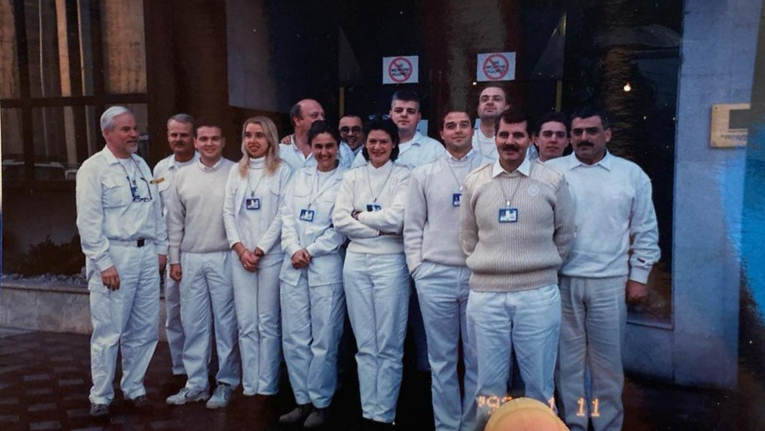By Johann Sattler
Recently, I came across an old photograph of myself and my colleagues in the European Community Monitoring Mission in Bosnia and Herzegovina from 1997.
At first I thought how much older I now look. Wrinkles can be ignored until out of the blue you are presented with a version of your younger self. I suppose I can take some consolation from the fact that I really don’t feel as ‘venerable’ as my appearance might suggest – and when it comes to important things like playing soccer, for example, if I have less stamina, well, I have more experience, so, age has its compensations.
The second thing that sprang to mind is that the organization I worked for in 1997 still had ‘European Community’ in the title; since then, of course, ‘European Union’ has been in the designation of worldwide missions.
I also thought how dramatically things have changed in Bosnia and Herzegovina. In 1997, my colleagues and I were monitoring refugee return; housing, roads and other infrastructure still had to be repaired; the economy was on life support; the trauma of the conflict was visible everywhere, and crossing the IEBL was at times a dicey experience.
Things aren’t perfect today – but they have improved immensely. We should, I think, always remember this.
And the last thing I thought about was the following: in 1997, I was sent here because the European Community already saw Bosnia and Herzegovina as a potential member state. It understood the fundamental truth that this country’s place is in the heart of Europe.
This hasn’t changed. And in the last quarter of a century, the EU has demonstrated its commitment to Bosnia and Herzegovina’s European future with actions as well as words. It has provided massive material assistance, diplomatic support, and billions of euros in aid and investment in order to help this country move towards a prosperous and secure future.
The EU continues to do this today – with even more focused assistance to help Bosnia and Herzegovina recover from the Covid-19 pandemic.
I and many of my colleagues in the international community repeatedly stress that it’s up to Bosnia and Herzegovina’s elected representatives to take the steps that are needed to move forward to prosperity and, in due course, EU membership. That is a simple statement of fact – executive and legislative branches are responsible for proposing, debating and enacting legislation. In comparison with 1997, there is a greater willingness at least to dabble with pragmatism – and, as we all know, a journey of a thousand miles begins with one step.
Despite the pandemic, we can take steps that will begin a shift. We can agree on reforms that are set out in the European Commission’s Opinion and ensure that Bosnia and Herzegovina delivers faster on its path to the EU. These reforms aim to ensure that human rights of all BiH citizens are fully respected, that the public services are better run and accessible to all, and that the judiciary is efficient and impartial. These goals are ambitious, but not impossible. And – it should not be forgotten – they are reforms that the citizens of Bosnia and Herzegovina support.
Many of these things once seemed a very long way off. Today they are much more certain, and I believe they can be achieved.
I have more experience now than I had 24 years ago, but when it comes to politics I have just as much stamina. I know that people of Bosnia and Herzegovina want change. I will work hard to help deliver that change.
One thing is absolutely certain: there is no going back to where we were a generation ago, even if I wouldn’t mind having fewer wrinkles.

